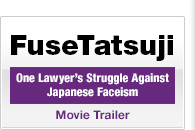Outline
With the annexation of the Korean peninsula by Japan in 1910, the Japanese enacted assimilationist policies, took land from Korean peasants, and thus created a large population of migrant Korean laborers. They worked in poor conditions in coalmines, textile factories, shipbuilding, and foundries. Victory in the Russo-Japanese War emboldened Japan to further military expansion on the Chinese mainland. However, in Japan itself inflation was rampant, the struggle to make ends meet had driven many to abandon their own children or even attempt suicide. To make matters worse, crime was rampant, labor disputes ongoing, and millions protested drastic food shortages. It was in these turbulent times that Fuse actively promoted workers and minorities’ rights and freedom.
Born in 1880, Fuse was influenced by his father’s passion for justice through his involvement in the “Freedom and People’s Rights Movement” of the 1880s. Fuse attended the Meiji Law School (later renamed Meiji University) and in 1902 at the age of 21 passed the bar examination and worked as a deputy prosecutor at the Utsunomiya courthouse. However it wasn't until the Ashio Mining Pollution Incident when Tanaka Shōzō delivered a plea directly to Emperor Meiji that Fuse realized he was on the wrong side of the legal system. Ten months later Fuse resigned as a prosecutor and started his career as a defense lawyer. It was around this time that Fuse read Tolstoy’s critique of the Russo-Japanese War and became and ardent admirer. Tolstoy was one of Fuse’s greatest inspirations for his quest to advance Japan’s justice system and fight against social oppression.
On the 1st of March 1919, a group of Korean activists read the declaration of Korean independence in Keijō (present-day Seoul) and the Korean people responded by uprising against Japanese colonial rule. The Japanese colonial police retaliation was brutal and oppressive. Fuse headed to Korea and defended many who participated in the independence movement while the same time delivering a severe critique of Japan’s colonial government.
Fuse also fought for every citizen’s right to political participation and pushed for more representative general elections. In 1921 during the heated debate surrounding the Kawasaki and Mitsui Shipbuilding labor dispute, Fuse establishes the “Japan Lawyers Association for Freedom”. Fuse was also active in investigating the massacre of Korean residents in the aftermath of the 1923 Great Kanto Earthquake, establishing the Tenant’s Association after World War I, and represented Kaneko Fumiko and Park Yeol after being accused of high treason in 1926.
Fuse proved time and time again his dedication to the rights of the downtrodden, a life of hard-fought battles against the increasingly despotic Japanese authorities. Things came to a head for Fuse while defending Koreans being charged with violating the Peace Preservation Law. He himself becomes the target of the authorities’ crackdown, and his publications are deemed to be in violation of the former Japanese Newspaper Law. His license to practice law is revoked and he is imprisoned. Worried about his father in prison, Fuse Morio is also arrested due to his involvement in student movements and tragically passes away while in prison.
After Japan’s defeat in World War II, Fuse drafted a proposal for the Korean National Constitution, and assisted in the defense of the Mitaka, Matsukawa and 1952 Bloody May Day Incidents. Never forgetting the suspicious circumstances of his son Morio’s death, Fuse dedicated his life to social justice, as illustrated by his lifelong motto: “Live with the people, die for the people.”
In the wake of the 2004 Niigata Chūetsu earthquake, many Korean people started collecting money for victims of the earthquake in the same way that Fuse had collected money for victims of the devastating Korean floods exactly 80 years earlier.
At this time, the Korean government bestowed the posthumous honor of “Order of Merit for National Foundation” to Fuse for his contribution to Korean national independence. Fuse walked and fought together with the oppressed and persecuted, never wavering in his dedication to preserving and defending basic human rights. We believe Fuse’s life motto still has meaning in today’s world.
Enquiries / DVD Sales
Price
Within Japan: 4000yen (includes tax and domestic postage)
Outside Japan: 5000yen (includes postage worldwide)
Product Details:
Format: Color, Dolby, Widescreen
Language: Japanese
Region: All
Number of discs: 1
Production Date: May 2010
DVD Release Date: January 2015
Run Time: 98 minutes
Subtitles: English, Korean
Please complete the form below for enquiries regarding DVD sales.
Surname:
First Name:
Institution:
Country:
Address 1:
Address 2:
Postal Code:
Email address:
Question / Inquiry (optional):




